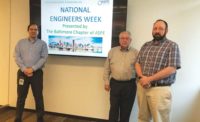The Central Florida ASPE chapter likes to think outside the box.
See the success of its annual sporting clay shoot as a prime example in which it teams with the West Coast Florida chapter to raise money for both groups and a dedicated scholarship fund. See also the annual presentations it now gives to engineering students at Central Florida University to stir excitement about the profession on campus. Last but not least, look at the upcoming Bahamas cruise it helped organize to bring together presidents and other representatives from every chapter in the Southeast region, along with reps from several manufacturers, to network and socialize in an informal setting.
The active chapter celebrated its 35th year last year, but it takes more stock in looking toward the future, says ASPE Central Florida Chapter President Eric Knauth, P.E., a past pme Plumbing Engineer of the Year and the plumbing department manager for exp in Maitland, Florida.
The annual sporting clay shoot was held in February and attracted 134 participants. Knauth doesn’t have the total figures yet, but he expects the amount raised by the event to land at around $10,000.
In addition to the new annual presentation at CFU, the chapter also hosted a tailgating event at a CFU football game last year to encourage younger membership.
The campus presentation proved especially productive.
“We spoke to a group of 50-60 kids,” he says. “And there were a handful of people who even knew about the plumbing industry. But after we gave our presentation, there were probably 25 kids who came up to us and spoke to us individually, asking more questions about the industry and for internships. It just created a stir within the campus to help spread the word about the industry as a whole.
“I ended up getting an intern out of that. My competitor, a former president, got at least one intern. There may have been interns who joined other firms as well, but it was great just to get more people knowledgeable about the profession.”
Local hot-button plumbing issues
Thinking outside the box, and bringing in multiple voices, helps the chapter create a “meeting of the minds” atmosphere when discussing popular topics in the region, such as the maximum length of hot water pipes to public lavatories or the jurisdictional unpredictability with grease interceptor sizing.
In 2017, Florida state code adopted an international code that restricted the dropdown hot water pipes to lavatories to 2 feet.
“Previously, you’d have your hot water piping running in the ceiling space, and then you’d drop down the wall to your hand sink,” he says.
Often, that meant a 10-foot dropdown pipe, and Florida code then allowed up to 50 feet. The new code restricts that to 2 feet, which means the main hot water pipe must run horizontally in the wall, rather than in the ceiling. That causes all sorts of challenges, especially since the pipe has to be insulated and may not fit the width of a 4-inch stud wall. The other topic Knauth often hears is the different requirements that each local jurisdiction has for grease interceptor sizing.
“Within the state alone it is quite substantial,” he says. “And some jurisdictions are really taking it to the limit as far as how to size interceptors, so that’s always an ongoing battle.”
Knauth says the chapter has had technical topics on both of these issues.
“One of the good things about our industry here in Orlando is that we have several large engineering firms, and there are typically representatives from several of them at the ASPE meetings,” he says. “So it’s great, because you have somebody from XYZ company saying, ‘Hey, this is how we do this,’ whereas somebody from ABC company says, ‘Hey, we do it this way, what do you think about this?’
“It’s basically sort of a ‘meeting of the minds’ to figure out the best way to do it. It’s a great conversation that a lot of times just erupts within our meetings as to how one firm does something vs. somebody else, just to help everybody out.”
– Ed McMenamin reporting




